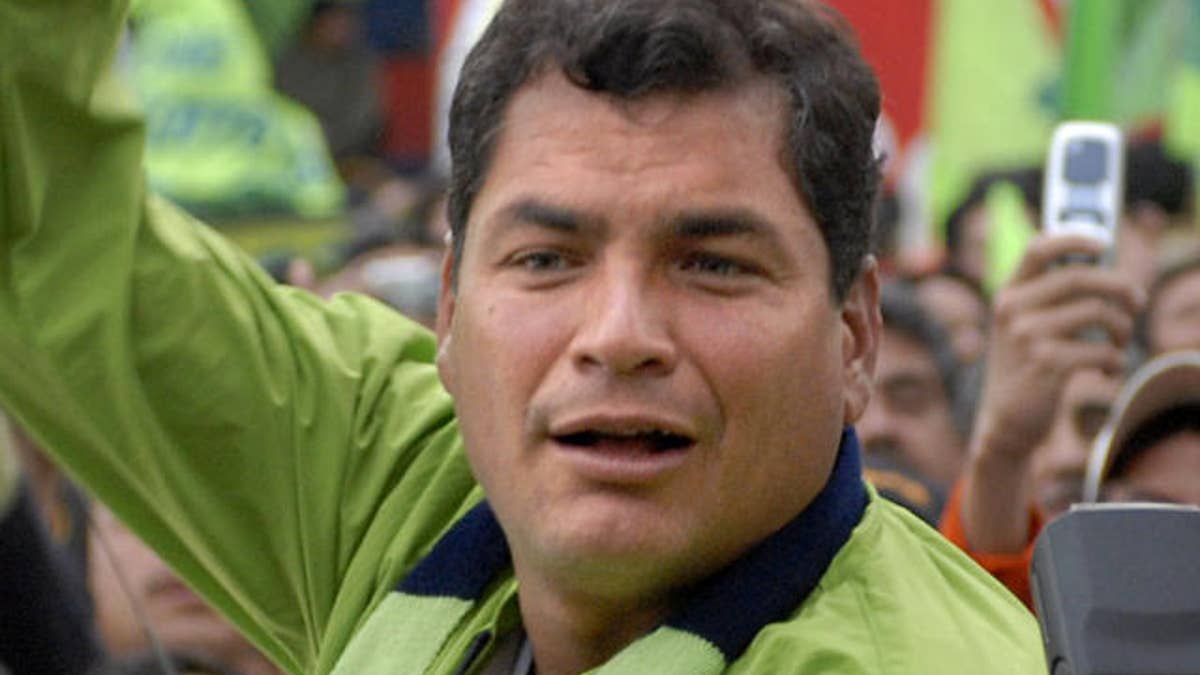
Ecuadoran President Rafael Correa (AP)
The characteristically pompous announcement last week by Ecuador’s president Rafael Correa that he would boycott the upcoming Summit of the Americas to protest the continued exclusion of the Cuban dictatorship reveals his vain hope of inheriting the mantle of the dying Venezuelan caudillo Hugo Chávez.
Since assuming office in 2007, Correa has followed Chávez’s playbook, which was inspired by the master tyrant, Fidel Castro. Former Washington Post reporter Douglas Farah has documented Correa’s corrupt roots, including the facts that his campaign took funds from the leftist Colombian narcoguerrillas and his closest advisors and crony judges have abetted drug trafficking. Such narco-corruption is a risky but lucrative tactic to raise hundreds of millions in cash, but it also requires a systematic attack on the rule of law.
In Ecuador, Correa is the law. He has gradually suffocated independent branches of government – notably the Congress and the courts – and concentrated power in his hands. His critics contend that he has resorted to blatant bribery to maintain control of the Congress. And a new supreme court has been packed with judges who are loyal to him and ready to do his bidding.
Like Chávez, Correa claims that a majority of the Ecuadorean voters have ratified his agenda – including a series of radical constitutional reforms. Just last May, two measures granting the president extraordinary powers to regulate the media and appoint judges were declared approved by Correa’s electoral authorities under very suspicious circumstances.
Unfortunately, much of this corruption and abuse of power has been masked by Ecuador’s oil wealth, with many of the nation’s poor satisfied by economic conditions buoyed by international oil prices.
Indeed, Correa’s many excesses had been neglected by the international community – until he took his war on the independent media to absurd heights. And, of course, his attack on the press has proven to be much more provocative to the world’s editorial boards than his systematic mugging of Ecuador’s rule of law and separation of powers.
At issue is Correa’s outlandish personal lawsuit against the venerable newspaper El Universo for publishing an opinion piece in which Emilio Palacio referred to Correa as a “dictator” and accused him of putting innocent lives at risk in suppressing a September 2010 police rebellion.
One of Correa’s crony judges made quick work of the 5,000-page case file, taking just two days to render a 60-page ruling that awarded Correa $40 million in damages against Palacio and the paper’s directors and sentencing them each to three years in jail. As expected, the sentence was upheld in February by Correa’s own National Court of Justice, after which Palacio and one of the directors sought political asylum outside their country.
After weeks of criticism, Correa pardoned the four men. Before the defenders of the free press congratulate themselves, they should remember that the legal precedent and chilling effect prevail.
The publishers of El Universo said they will “continue to fight for the freedom of expression and equal access to justice in Ecuador by appealing to the Inter-American Commission on Human Rights.” Moreover, Correa continues the relentless judicial assault on the Isaias family, whose three television stations and 200 other companies were expropriated – some at gunpoint – in 2008.
Some have tried to explain Correa’s attack on the media by citing his personal pique. However, as with the caudillos in Venezuela, Bolivia and Argentina, attacks on the media are not tantrums, they are tactics. As they move to put the country’s institutions in a political chokehold, they have to muzzle the independent media. Venezuela’s government has levied exorbitant fines and canceled broadcast licenses. Bolivia’s regime has purchased oficialista newspapers. Argentina’s party has attacked media conglomerates and taken control of newsprint.
It might be argued that Chavismo as an international movement will fade away with Chávez. Correa, who fancies himself an intellectual giant, appears to be rehearsing to be the new leader of the region’s radicals.
It remains to be seen whether he has the guts to play that role.
For example, when word leaked out that Iran was looking to mine uranium in Ecuador, Correa cowered, making the pusillanimous claim that, “This is the first time in my life that I’ve heard that Ecuador has uranium.”
Fortunately for Correa, in Latin America today it does not take courage to defend the Castro dictatorship and to argue that it should be embraced at the regional Summit in Cartagena. For Correa, there is nothing wrong with the Castro regime. That speaks volumes about him and what he has in mind for Ecuador and the rest of Latin America.
Roger F. Noriega was Ambassador to the Organization of American States from 2001-03 and Assistant Secretary of State from 2003-05. He is a visiting fellow at the American Enterprise Institute and managing director of Vision Americas LLC, which represents U.S. and foreign clients, and he contributes to www.interamericansecuritywatch.com.
